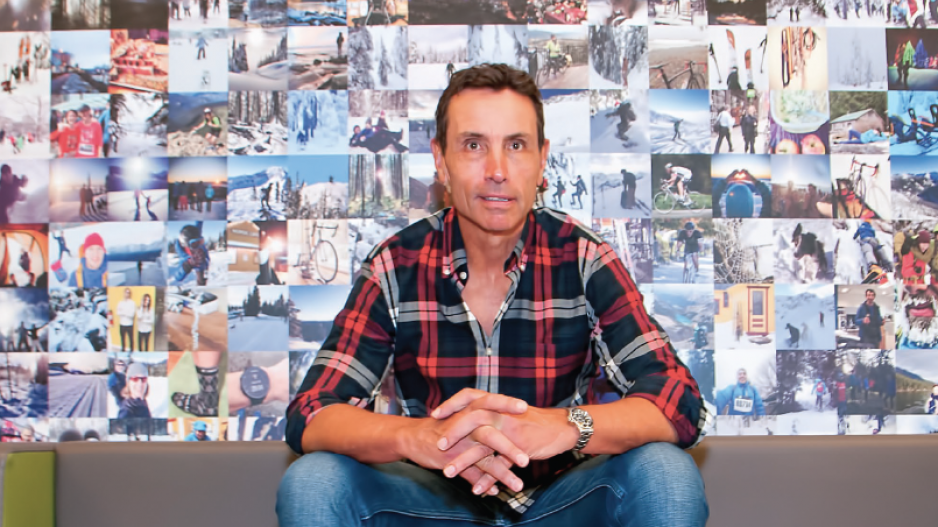When Mountain Equipment Co-op was founded in 1971, it had six members and $65 in working capital.
Today, it has more than four million members, 22 bricks-and-mortar stores across Canada, 2,450 employees and sales of $465 million in 2016-17.
That kind of expansion doesn’t happen without growing pains and an ability to anticipate rapidly changing consumer trends.
MEC’s original customer-member base was almost exclusively white male mountain climbers; today it is a diverse mix of men and women who are health and fashion conscious, as well as socially aware. The co-op’s product line now ranges from kayaks and mountain bikes to yoga wear and backpacks. Thirty-six per cent of the products it sells are MEC’s own brand.
Even Mountain Equipment Co-op’s name has changed: it rebranded in 2012 to MEC.
MEC’s CEO, David Labistour, waxes philosophic when speaking about change. It’s something he clearly thinks about a lot.
He has faced significant changes in his personal life and career, starting with growing up in South Africa when the country was convulsed in a major shift from the apartheid system, followed by being drafted into the army, where he saw combat in a border war with Angola, and then starting a new life in Canada – a move that ended his first marriage.
The ability to anticipate trends in the retail space and consumer habits and adapt to them is something of a cornerstone business philosophy for the 62-year-old executive.
“David has this unique ability of seeing the future that sits over the edge of the horizon, while being able to engage others to boldly embrace and move toward that future,” said Rick Kohn, partner in audit, consumer products and retail at Deloitte.
Labistour noted that the accelerated pace of change today requires extreme corporate agility.
“In the consumer space, you can no longer defer to precedence because there is no precedence today. As a result of the changes, you can’t look at case history.”
Labistour attributes his success not to passion, but to a pragmatic sense of knowing what he’s good at. He has a passion for surf sailing, for example, and even became a full-time beach bum for about nine months, after dropping out of university.
After high school, at the age of 19, he was drafted into the army. He went straight into officer training to become a second lieutenant.
After two and half years in the army, he enrolled in university to take a bachelor’s degree with a focus on the performance arts, which included stagecraft, theatre, lighting and costume design. The latter would come in handy when he eventually got into the apparel industry.
Labistour dropped out of university a few months before graduation to hang around beaches and spend his days surf sailing. After nine months of doing that, he got a job in the apparel business and ended up with Adidas, where he headed the apparel side of the operations, got married and had a son.
Post-apartheid South Africa witnessed an increase in crime and violence, which led Labistour and his wife to emigrate.
“My wife wanted to leave South Africa because she witnessed a life-threatening situation, and it freaked her out completely,” he said.
By then, he had developed another passion – snowboarding – which brought him to North America and, eventually, Vancouver, on a snowboarding trip.
It was on that trip that he realized that it was the perfect place for him and his young family – “a winter Cape Town,” as he described it.
In 1999, he arrived in Vancouver with his wife and four-year-old son.
They had enough savings to put a down payment on a house and a car and survive for a year, by which time they both fully expected to have good jobs. But that didn’t happen, and the stress eventually led to divorce. Labistour later remarried and now has two sons, aged 21 and 12, the eldest being from his first marriage.
Labistour pounded the pavement, knocking on the doors of companies where he thought he’d be a perfect fit – Arc’teryx and Mountain Equipment Co-op – thanks to his experience in apparel product design and development. But no one would hire him.
So he hung out a shingle as a consultant and landed his first contract with Aritzia. In 2003, when MEC restructured and needed someone to head its products side, he got a job offer as chief product officer.
In 2008, he was promoted to CEO. Since then, MEC has added new stores across Canada and invested in a new head office on Vancouver’s Great Northern Way. It employs a staff of 350. In 2011, MEC had 15 stores; today it has 22.
In the summer, in his off time, Labistour’s favourite thrill sports include mountain biking and kite boarding. In the winter it’s skiing and snowboarding.
Being CEO of a company that happens to make and sell a lot of the gear for those sports means that, despite his personal philosophy that people should follow their talent, not their passions, in developing a career, he seems to have landed in something of a sweet spot at MEC.
“This is the first time that my work and my passion have intersected, in my whole career, so it’s pretty cool from that perspective.” •
– Deloitte contributed to this story.
Join us to celebrate this year’s honourees at the 2017 BC CEO Awards November 8, 2017, hosted at the Fairmont Waterfront Hotel. For tickets and event info, visit www.biv.com/ceo.




